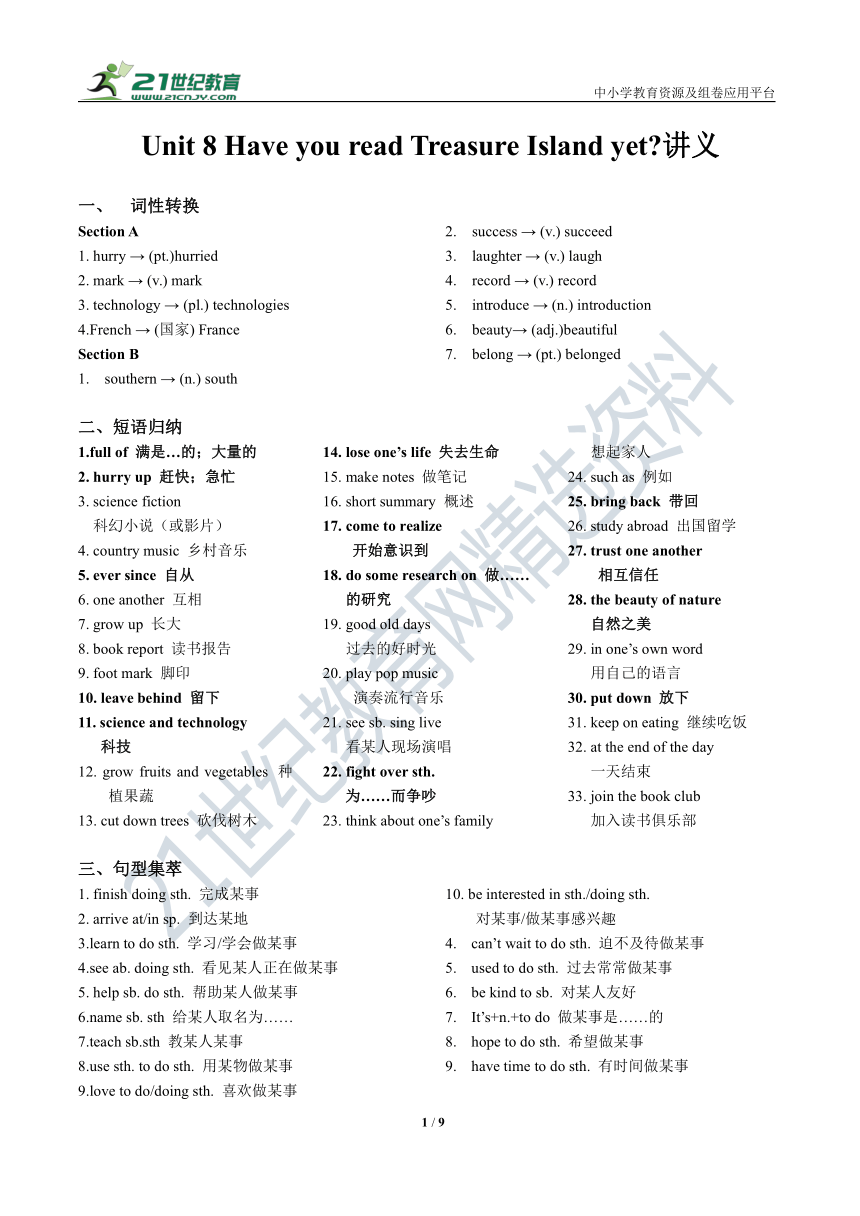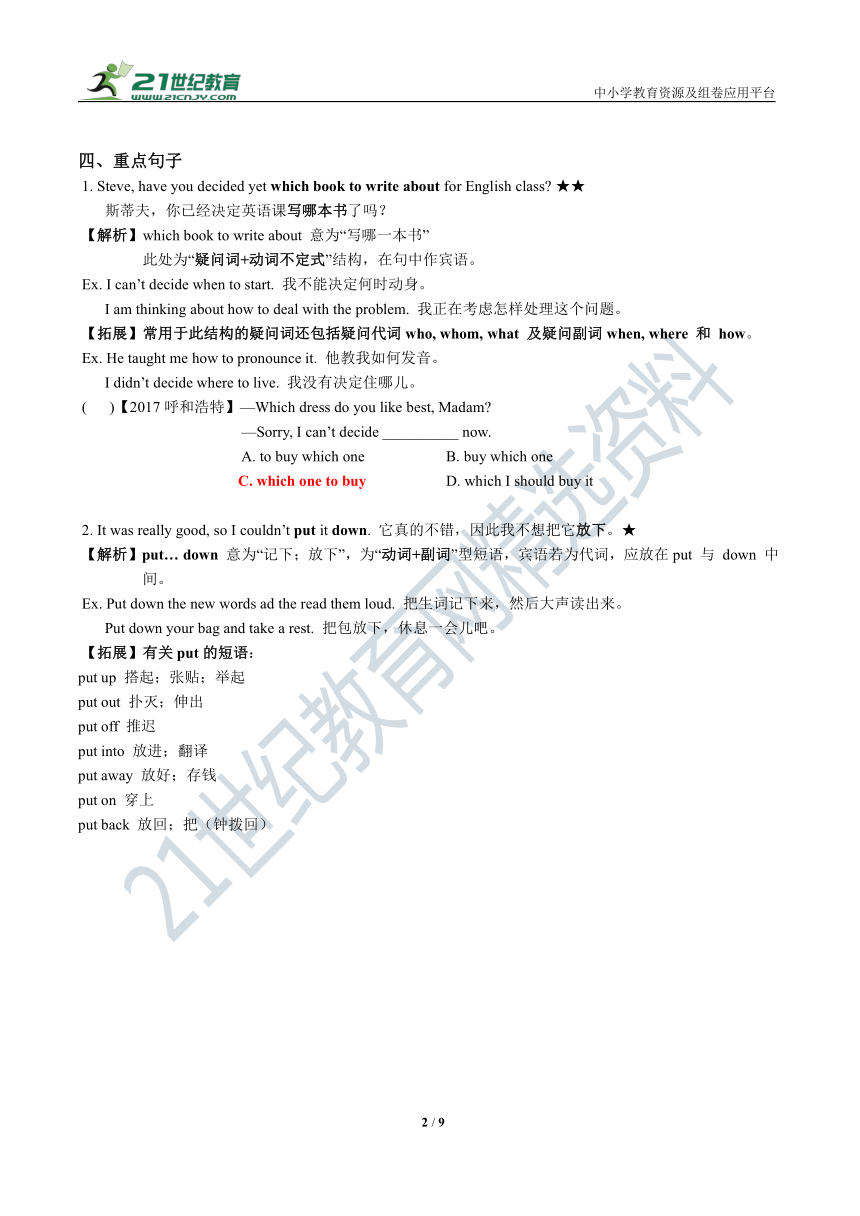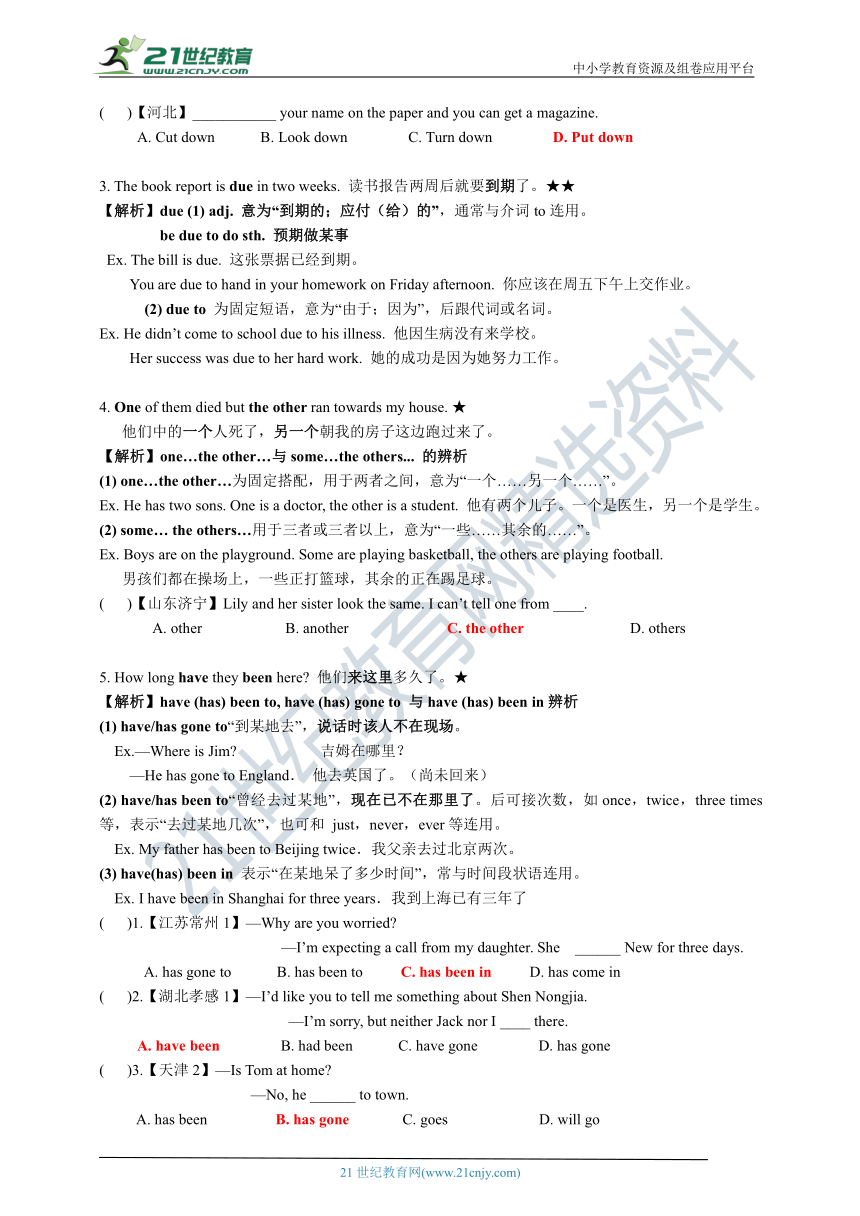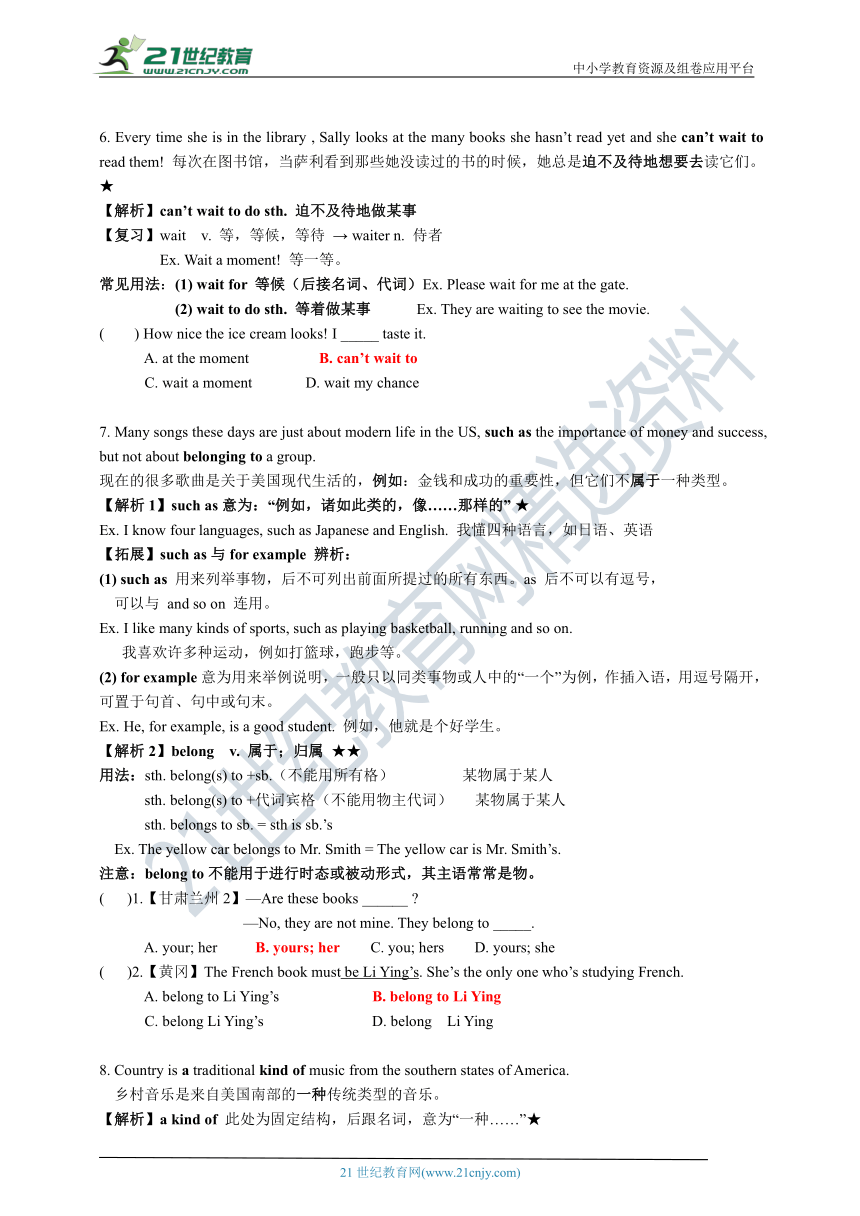Unit 8 Have you read Treasure Island yet?单元知识点讲义
文档属性
| 名称 | Unit 8 Have you read Treasure Island yet?单元知识点讲义 |  | |
| 格式 | zip | ||
| 文件大小 | 1.2MB | ||
| 资源类型 | 试卷 | ||
| 版本资源 | 人教新目标(Go for it)版 | ||
| 科目 | 英语 | ||
| 更新时间 | 2020-02-04 19:13:54 | ||
图片预览




文档简介
中小学教育资源及组卷应用平台
Unit 8 Have you read Treasure Island yet?讲义
词性转换
Section A
1. hurry → (pt.)hurried
2. mark → (v.) mark
3. technology → (pl.) technologies
4.French → (国家) France
Section B
1. southern → (n.) south
2. success → (v.) succeed
3. laughter → (v.) laugh
4. record → (v.) record
5. introduce → (n.) introduction
6. beauty→ (adj.)beautiful
7. belong → (pt.) belonged
二、短语归纳
1.full of 满是…的;大量的
2. hurry up 赶快;急忙
3. science fiction
科幻小说(或影片)
4. country music 乡村音乐
5. ever since 自从
6. one another 互相
7. grow up 长大
8. book report 读书报告
9. foot mark 脚印
10. leave behind 留下
11. science and technology
科技
12. grow fruits and vegetables 种植果蔬
13. cut down trees 砍伐树木
14. lose one’s life 失去生命
15. make notes 做笔记
16. short summary 概述
17. come to realize
开始意识到
18. do some research on 做……的研究
19. good old days
过去的好时光
20. play pop music
演奏流行音乐
21. see sb. sing live
看某人现场演唱
22. fight over sth.
为……而争吵
23. think about one’s family
想起家人
24. such as 例如
25. bring back 带回
26. study abroad 出国留学
27. trust one another
相互信任
28. the beauty of nature
自然之美
29. in one’s own word
用自己的语言
30. put down 放下
31. keep on eating 继续吃饭
32. at the end of the day
一天结束
33. join the book club
加入读书俱乐部
三、句型集萃
1. finish doing sth. 完成某事
2. arrive at/in sp. 到达某地
3.learn to do sth. 学习/学会做某事
4.see ab. doing sth. 看见某人正在做某事
5. help sb. do sth. 帮助某人做某事
6.name sb. sth 给某人取名为……
7.teach sb.sth 教某人某事
8.use sth. to do sth. 用某物做某事
9.love to do/doing sth. 喜欢做某事
10. be interested in sth./doing sth.
对某事/做某事感兴趣
can’t wait to do sth. 迫不及待做某事
used to do sth. 过去常常做某事
be kind to sb. 对某人友好
It’s+n.+to do 做某事是……的
hope to do sth. 希望做某事
have time to do sth. 有时间做某事
四、重点句子
1. Steve, have you decided yet which book to write about for English class? ★★
斯蒂夫,你已经决定英语课写哪本书了吗?
【解析】which book to write about 意为“写哪一本书”
此处为“疑问词+动词不定式”结构,在句中作宾语。
Ex. I can’t decide when to start. 我不能决定何时动身。
I am thinking about how to deal with the problem. 我正在考虑怎样处理这个问题。
【拓展】常用于此结构的疑问词还包括疑问代词who, whom, what 及疑问副词when, where 和 how。
Ex. He taught me how to pronounce it. 他教我如何发音。
I didn’t decide where to live. 我没有决定住哪儿。
( )【2017呼和浩特】—Which dress do you like best, Madam?
—Sorry, I can’t decide __________ now.
A. to buy which one B. buy which one
C. which one to buy D. which I should buy it
2. It was really good, so I couldn’t put it down. 它真的不错,因此我不想把它放下。★
【解析】put… down 意为“记下;放下”,为“动词+副词”型短语,宾语若为代词,应放在put 与 down 中间。
Ex. Put down the new words ad the read them loud. 把生词记下来,然后大声读出来。
Put down your bag and take a rest. 把包放下,休息一会儿吧。
【拓展】有关put的短语:
put up 搭起;张贴;举起
put out 扑灭;伸出
put off 推迟
put into 放进;翻译
put away 放好;存钱
put on 穿上
put back 放回;把(钟拨回)
( )【河北】___________ your name on the paper and you can get a magazine.
A. Cut down B. Look down C. Turn down D. Put down
3. The book report is due in two weeks. 读书报告两周后就要到期了。★★
【解析】due (1) adj. 意为“到期的;应付(给)的”,通常与介词to连用。
be due to do sth. 预期做某事
Ex. The bill is due. 这张票据已经到期。
You are due to hand in your homework on Friday afternoon. 你应该在周五下午上交作业。
(2) due to 为固定短语,意为“由于;因为”,后跟代词或名词。
Ex. He didn’t come to school due to his illness. 他因生病没有来学校。
Her success was due to her hard work. 她的成功是因为她努力工作。
4. One of them died but the other ran towards my house. ★
他们中的一个人死了,另一个朝我的房子这边跑过来了。
【解析】one…the other…与some…the others... 的辨析
(1) one…the other…为固定搭配,用于两者之间,意为“一个……另一个……”。
Ex. He has two sons. One is a doctor, the other is a student. 他有两个儿子。一个是医生,另一个是学生。
(2) some… the others…用于三者或三者以上,意为“一些……其余的……”。
Ex. Boys are on the playground. Some are playing basketball, the others are playing football.
男孩们都在操场上,一些正打篮球,其余的正在踢足球。
( )【山东济宁】Lily and her sister look the same. I can’t tell one from ____.
A. other B. another C. the other D. others
5. How long have they been here? 他们来这里多久了。★
【解析】have (has) been to, have (has) gone to 与have (has) been in辨析
(1) have/has gone to“到某地去”,说话时该人不在现场。
Ex.—Where is Jim? 吉姆在哪里?
—He has gone to England. 他去英国了。(尚未回来)
(2) have/has been to“曾经去过某地”,现在已不在那里了。后可接次数,如once,twice,three times等,表示“去过某地几次”,也可和 just,never,ever等连用。
Ex. My father has been to Beijing twice.我父亲去过北京两次。
(3) have(has) been in 表示“在某地呆了多少时间”,常与时间段状语连用。
Ex. I have been in Shanghai for three years.我到上海已有三年了
( )1.【江苏常州1】—Why are you worried?
—I’m expecting a call from my daughter. She ______ New for three days.
A. has gone to B. has been to C. has been in D. has come in
( )2.【湖北孝感1】—I’d like you to tell me something about Shen Nongjia.
—I’m sorry, but neither Jack nor I ____ there.
A. have been B. had been C. have gone D. has gone
( )3.【天津2】—Is Tom at home?
—No, he ______ to town.
A. has been B. has gone C. goes D. will go
6. Every time she is in the library , Sally looks at the many books she hasn’t read yet and she can’t wait to read them! 每次在图书馆,当萨利看到那些她没读过的书的时候,她总是迫不及待地想要去读它们。★
【解析】can’t wait to do sth. 迫不及待地做某事
【复习】wait v. 等,等候,等待 → waiter n. 侍者
Ex. Wait a moment! 等一等。
常见用法:(1) wait for 等候(后接名词、代词)Ex. Please wait for me at the gate.
(2) wait to do sth. 等着做某事 Ex. They are waiting to see the movie.
( ) How nice the ice cream looks! I _____ taste it.
A. at the moment B. can’t wait to
C. wait a moment D. wait my chance
7. Many songs these days are just about modern life in the US, such as the importance of money and success, but not about belonging to a group.
现在的很多歌曲是关于美国现代生活的,例如:金钱和成功的重要性,但它们不属于一种类型。
【解析1】such as意为:“例如,诸如此类的,像……那样的” ★
Ex. I know four languages, such as Japanese and English. 我懂四种语言,如日语、英语
【拓展】such as与for example 辨析:
(1) such as 用来列举事物,后不可列出前面所提过的所有东西。as 后不可以有逗号,
可以与 and so on 连用。
Ex. I like many kinds of sports, such as playing basketball, running and so on.
我喜欢许多种运动,例如打篮球,跑步等。
(2) for example意为用来举例说明,一般只以同类事物或人中的“一个”为例,作插入语,用逗号隔开,可置于句首、句中或句末。
Ex. He, for example, is a good student. 例如,他就是个好学生。
【解析2】belong v. 属于;归属 ★★
用法:sth. belong(s) to +sb.(不能用所有格) 某物属于某人
sth. belong(s) to +代词宾格(不能用物主代词) 某物属于某人
sth. belongs to sb. = sth is sb.’s
Ex. The yellow car belongs to Mr. Smith = The yellow car is Mr. Smith’s.
注意:belong to不能用于进行时态或被动形式,其主语常常是物。
( )1.【甘肃兰州2】—Are these books ______ ?
—No, they are not mine. They belong to _____.
A. your; her B. yours; her C. you; hers D. yours; she
( )2.【黄冈】The French book must be Li Ying’s. She’s the only one who’s studying French.
A. belong to Li Ying’s B. belong to Li Ying
C. belong Li Ying’s D. belong Li Ying
8. Country is a traditional kind of music from the southern states of America.
乡村音乐是来自美国南部的一种传统类型的音乐。
【解析】a kind of 此处为固定结构,后跟名词,意为“一种……”★
Ex. An apple is a kind of fruit. 苹果是一种水果。
【拓展】与kind有关的短语:★★
(1) kind of +adj. 有点……,相当于a little/a bit/a little bit
Ex. I am kind of hungry. 我有点饿了。
(2) all kinds of+n. 各种各样的……
Ex. We have all kinds of time to finish the job. 我们有充足的时间完成这项任务。
(3) different kinds of+n. 不同种类的……
Ex. We have all kinds of books in a bookshop. 书店里有不同种类的书籍。
(4) be kind to sb. 对某人友好= be friendly to
Ex. We must be kind to wild animals. 我们必须友好对待野生动物。
(5) what kind of ….的种类(用来询问事物的类别)
( ) — _____ rice would you like?
— Small , please.
A. What kind of B. What size C. What size of D. What size bowl of
9. He’s sold more than 120 million records. 他的唱片销量已经超过1.2亿张。★
【解析】million 一百万
hundred n. 百 hundreds of 数以百的
thousand n. 千 thousands of成千上万的
million n. 百万 millions of成百万的
【注意】:(1) 当million 前面有具体的数字时,million用单数形式。
(2) 当million 后与of 连用时用复数形式,millions of 是数百万的意思,前面不能加数词
Ex. Three million workers planted millions of trees. 三百万工人种了成百万棵树。
( )1.【四川广元】—Guang’an is a beautiful city, isn’t it?
—Yes, There are about two ______ visitors here every week.
A. thousands of B. thousands C. thousand
( )2.【雅安】We planted _______ trees last year.
A. hundreds of B. hundred of
C. five hundreds D. five hundred of
( )3.【宜宾】—“Food Safety” has become one of the hottest topics recently.
—Yeah, it receives __________ Internet hits(点击) a day.
A. thousands B. thousand of C. thousands of D. ten thousands
10. Have you introduced this singer/ writer to other? 你给其他人介绍过这个歌手/作家吗?
【解析】introduce v. 介绍;引进 → introduction n. 介绍★
用法:(1) introduce oneself to sb. 向某人作自我介绍
Ex. Let me introduce myself to you. 让我介绍一下自己。
(2) introduce A to B. 把A介绍给B
Ex. May I introduce my friend Jim to you? 我可以把我的朋友吉姆介绍给你吗?
(3) introduce into 引进★★★
Ex. The scientists introduced into a new technology. 科学家们引进了一种新技术。
( ) —Hello ,everyone!
—Please let me ______.
A. introduce my name B. introduce myself
C. to introduce myself D. introduce to myself
11. The number of records he has sold. 他已售出唱片的数量。★★
【解析】the number of…“……的数量”,作主语时,谓语动词要用单数。
Ex. The number of visitors to Hong Kong is growing larger. 去香港的游客的数量在迅速增长。
【拓展】the number of与a number of 辨析:
(1) the number of 表示“……的数量”,后跟复数名词连用作主语时,中心词是number, 谓语动词用单数。
Ex. The number of students in our class is 30. 我们班学生数量是30.
(2) a number of 表示“大量的,许多”,相当于many,修饰可数名词复数。作主语时,其后谓语动词用复数。number前可用large, small等修饰。
Ex. A number of students are planting trees on the hill. 许多学生在小山上植树。
( )1. — A number of students ____ in the dinning hall.
—Let me count. The number of the students _____ about 400.
A. are ; is B. is ;are C. are; are
( )2.【贵州安顺1】In our school library there ___ a number of books on science, and in these years the number of them ___ growing larger and larger.
A. are; is B. is; are C. have; are D. has; is
五、重点语法
现在完成时
一、概念:①一个动作开始于过去,持续到现在并有可能持续到将来。
②表示过去发生的或已经完成的动作对现在造成的影响或结果。
二、结构:have/has +过去分词 have/has been +过去分词
三、句型:肯定句:主语+have/has +过去分词+其他 Ex. The car has arrived.
否定句:主语+have/has +not +过去分词+其他 Ex. The car hasn’t arrived
一般疑问句:have/has+主语+过去分词+其他 Ex. Has the car arrived?
特殊疑问句:特殊疑问词+have/has +主语+过去分词+其他 Ex. When has the car arrived?
四、动词过去分词的变化规则:
(1)一般情况加-ed.
(2)以不发音e结尾的,直接加-d.
(3)以辅音字母加y结尾的,变y为i, 再加-ed.
(4)重度闭音节单词,双写词尾辅音字母,再加-ed.
(5)不规则动词过去分词变化需特殊记忆。
五、用法:
(1)常见的时间状语:recently, lately, so far, up to now, before, ever, never, already, yet, still等;其中already用于肯定句,ever用于疑问句;yet 用于否定句和疑问句。
【注意】yet / already辨析
already 通常用于肯定句中,意为“已经”,位于行为动词之前,be动词、助动词之后。
Ex. We have already cleaned the classroom. 我们已经打扫了教室。
yet用于疑问句中表示“已经”;用于否定句中,表示“还(没)”。
Ex.—Has he found his watch yet? 他找到手表了吗?
—No, not yet. 还没。
already与yet互换:把含有already的陈述句变为否定句或疑问句时,把already改为yet,
并放于句末。
Ex. I have already finished reading the book. 我已经读完这本书。
→ I haven’t finished reading the book yet. 我还没有读完这本书。(否定句)
(2)for+一段时间
Ex. I have taught him English for three years. 我教他英语已经三年了。
(3)since+过去时间点
Ex. I have taught him English since three years ago. 我三年前就在教他英语了。
(4)have been to &have gone to 用法辨析
have been to 表示“过去去过而现在已经返回”;
have gone to 表示“某人去了某地(还没有回来)”;
Ex. I have been to Wuhan and John has gone to Wuhan these days. 我去过武汉,约翰已经去武汉了。
(5)在现在完成时中,谓语动词必须是延续性动词,表示延续的动作。
Ex. 我买这本书已经三天了。
I have borrowed this book for three days. (×)
I have kept this book for three days. (√)
六、真题演练
( )1.【常州】—Why are you worried?
—I’m expecting a call from my daughter. She________ New York for three days.
A. has gone to B. has been to C. has been in D. has come in
( )2.【娄底】—What did you do last night?
—I _________TV and read books.
A. watch B. watched C. have watched
( )3.【衡阳】—Look at these stamps. I _____ them for five years.
—Wow, they are wonderful.
A. kept B. have kept C. have bought
( )4.【宜昌】—Do you know who took the students to the old people’s home, Tony?
—Well, Mr. Smith _______.
A. took B. does C. did D. do
( )5.【2017孝感】—I’d like you to tell me something about Shen Nongjia.
—I’m sorry, but neither Jack nor I ____ there.
A. have been B. had been C. have gone D. has gone
( )6.【襄阳】—We all went to the cinema except you last night. Why didn't you come?
—Because I ______ that movie twice.
A. have watched B. had watched C. was watching D. would watch
( )7.【天津】—Is Tom at home?
—No, he ______ to town.
A. has been B. has gone C. goes D. will go
( )8.【雅安】He_____ for ten years.
A. has been married B. married C. got married D. has married
( )9.【杭州】Sally took a photo of her friends while they _________ computer games.
A. play B. are playing C. have played D. were playing
( )10. 【重庆】It will be hard for us to get up in the morning if we ____to bed too late.
A. go B. went C. will go D. have gone
( )11.【成都】—Jack, let’s go to see the movie Harry Potter.
—Oh, I ______ it many times. So I don’t want to see it.
A. have seen B. see C. will see
( )12.【广州】—Why don’t you go to the movie with me, Betty?
—Because I ______ it before.
A. saw B. have seen C. see
105 / 122
同课章节目录
- Unit 1 What's the matter?
- Section A
- Section B
- Unit 2 I'll help to clean up the city parks.
- Section A
- Section B
- Unit 3 Could you please clean your room?
- Section A
- Section B
- Unit 4 Why don't you talk to your parents?
- Section A
- Section B
- Unit 5 What were you doing when the rainstorm came
- Section A
- Section B
- Review of Units 1-5
- Unit 6 An old man tried to move the mountains.
- Section A
- Section B
- Unit 7 What's the highest mountain in the world?
- Section A
- Section B
- Unit 8 Have you read Treasure Island yet?
- Section A
- Section B
- Unit 9 Have you ever been to a museum?
- Section A
- Section B
- Unit 10 I've had this bike for three years.
- Section A
- Section B
